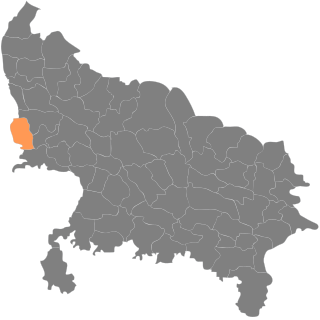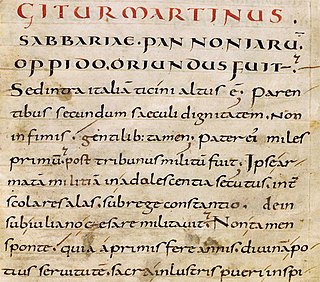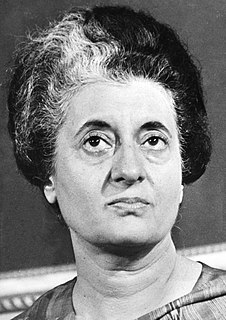
Mathura is a city in the Indian state of Uttar Pradesh. It is located approximately 50 kilometres (31 mi) north of Agra, and 145 kilometres (90 mi) south-east of Delhi; about 11 kilometres (6.8 mi) from the town of Vrindavan, and 22 kilometres (14 mi) from Govardhan. It is the administrative centre of Mathura district of Uttar Pradesh. In ancient times, Mathura was an economic hub, located at the junction of important caravan routes. The 2011 Census of India estimated the population of Mathura at 441,894.

Neem Karoli Baba or Neeb Karori Baba - known to his followers as Maharaj-ji - was a Hindu guru, mystic and devotee of the Hindu deity Hanuman. He is known outside India for being the guru of a number of Americans who travelled to India in the 1960s and 1970s, the most well-known being the spiritual teachers Ram Dass and Bhagavan Das, and the musicians Krishna Das and Jai Uttal. His ashrams are in Kainchi, Vrindavan, Rishikesh, Shimla, Neem Karoli village near Khimasepur in Farrukhabad, Bhumiadhar, Hanuman Gadi, Lucknow, Delhi in India and in Taos, New Mexico, USA.
Contemporary Sant Mat Movements are esoteric philosophy movements active in the United States, Europe, Latin America, and especially India. These movements assert that Sant Mat shares a lineage with Sikhism and contains elements of thought found in Hinduism, such as karma and reincarnation. They further assert that Sant Mat also contains elements found in Sufism and has inspired and influenced a number of religious groups and organizations. They refer to this spiritual path as the "Science of the Soul" or ‘Sant Mat’, meaning ‘teachings of the saints’. More recently it has been described as "The Way of Life" or "Living the Life of Soul." It incorporates a practical yoga system known as Surat Shabd Yoga.
Surat Shabd Yoga or Surat Shabda Yoga is a type of spiritual yoga practice in the Sant Mat tradition.

Vrindavan, also known as Brindaban, is a historical city in the Mathura district of Uttar Pradesh, India. It is one of the main locations in the Braj Bhoomi region, and is also where, according to Hinduism, Lord Krishna spent his most of the childhood days. The town is about 11 km away from Mathura, Krishna's birthplace on the Agra-Delhi highway. The town hosts many temples dedicated to the worship of Radha and Krishna and is considered sacred by Vaishnavism.
Gokula Singh was a Jat zamindar of Tilpat, in what is now the state of Haryana, India. The second of four sons born to Madu, his birthname was Ola. Gokula provided leadership to the Jat peasants who challenged the power of the Mughal Empire.

Born Shri Beli Ram Ji, Shri Swami Swarupanand ji Maharaj, was an Indian Guru of Shri Paramhans Advait Mat lineage. He is also known as "Shri Nangli Niwasi Bhagwaan Ji", as "Hari Har Baba", as "Sadhgurudev Ji" and as "Second Guru". Born in village Teri in Kohat district, India, the young Beli Ram Ji was initiated into the sanyasas in the early 1900s in Teri by Shri Paramhans Swami Advaitanand Ji, who named him Shri Swami Swarupanand Ji. During Swami Advaitanand ji's life, Swami Swarupanand ji created an order of sanyasis in northern India and founded several centers with the purpose of disseminating his master's teachings.
Godman is a colloquial term used in India for a type of charismatic guru. They usually have a high-profile presence, and are capable of attracting attention and support from large sections of the society. Godmen also sometimes claim to possess paranormal powers, such as the ability to heal, the ability to see or influence future events, and the ability to read minds.

Sultanpur Lodhi is a city and a Municipal Council in the Kapurthala district in the Indian state of Punjab. The town is named after its founder, Sultan Khan Lodhi, who was a general of Mahmud of Ghazni in 1103 AD, and has also been mentioned in the Ain-e-Akbari. Sultanpur Lodhi is located on the south bank of a seasonal rivulet called Kali Bein, which runs 6 miles (9.7 km) north of the intersection of Beas and Sutlej Rivers, two of the Five Rivers of Punjab. The word Punj - ab, literally means five river - land.

Ajaib Singh, also known as Sant Ajaib Singh and to his disciples as 'Sant Ji' was born on September 11, 1926, in Maina, Bhatinda district, Punjab, India.
Nirankari is a society-sect in Northern Delhi.
Shantikunj is the headquarters of the spiritual and social organisation All World Gayatri Pariwar (AWGP). Established in 1971 at Haridwar, it has emerged over the years as a center of the global movement of Yug Nirman Yojana for moral-spiritual regeneration in the light of hoary Indian heritage. Situated at the bank of holy Ganges and between the Shivalik ranges of the Himalayas, it is also a place of attraction for tourists and seekers of spiritual guidance.

Manavta Mandir or Be Man Temple in Hoshiarpur, Punjab, India was established in 1962 by Baba Faqir Chand (1886-1981). In order to carry forward the mission of his religion of humanity, Faqir, with the financial help from Seth Durga Das established the temple which remained his center of activity till he died in 1981. The temple houses a statue of his guru, Shiv Brat Lal and portraits of other prominent gurus of Sant Mat, Radha Soami Mat and Sufi Mat.

Naam Yog Sadhna Mandir is a temple in Mathura, India. It is presided over and was constructed for the guru Jai Gurudev and is also known as the Jai Gurudev Temple.
The Kokilavan Dham is the place where the famous Shani Dev Temple is situated in Kosi Kalan near Mathura in Uttar Pradesh, India. As the temple exists in the densed jungle (van), this place is named kokilavan. This is very ancient temple of Shani Dev and his guru Barkhandi baba. The devotees from all over the India come here to do pooja here.

Baba Devi Sahab (1841–1919) was one of the leaders of the Sant Mat religious movement, popularizing it throughout North India and Pakistan.
Pilot Baba is an Indian spiritual guru who was previously Wing Commander Kapil Singh, a fighter pilot with the Indian Air Force. Pilot Baba has established a number of Ashrams and spiritual centers in India and abroad.

Rampal is an Indian religious leader (godman), who claims to be spiritual successor and an incarnation of Kabir. He is currently under a life sentence for murder in the Hisar Central jail.

The 2016 Mathura clash occurred on 2 June, 2016, when 2 policemen and about 100 squatters were killed in an armed conflict at Jawahar Bagh public park in Mathura city in Uttar Pradesh, India.















